Bang for the Buck: Building a premier fishery with pelleted food
By Matt Ward
Fisheries at their most fundamental are a combination of habitat, fish, and people.
The perfect blend of these three ingredients should create a healthy system with plenty and bigger fish for fishermen to target.
Many factors go into creating a successful fishery, but likely the single most efficient step toward improving an angler experience is a fish feeding program.
High Points
After 15 years of doing this job, I already know that some of your eyes are glazing over as the image of little brown pellets of feed flying out over your pond fails to inspire.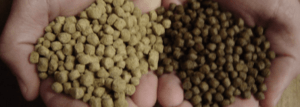
But try a few of these facts on for size:
Compare that to forage fish, for which bass must consume 10 pounds to generate one pound of body weight.
As for cost, quality fish food can be fairly expensive compared to some other animal feeds. But considering our conversion rates, we can usually grow forage like bluegill for around $2 per pound, which is much less expensive than purchasing bluegill from a hatchery.
In the end quality fish food is about 20 times more efficient than fish stocking when it comes to feeding fish in an established fishery.
Why Does the Type of Feed I Use Matter?
Different fish have different nutrition requirements.
Catfish can often be efficiently grown on relatively inexpensive low protein feed. Higher order predators or insectivores generally thrive on higher protein feed.
At Lochow Ranch, most of our pond management and lake management services and products focus on feeding largemouth, hybrid striped bass, bluegill, and trout, all great choices when pond stocking.
We manufacture a custom feed specially formulated for accelerated fish growth in intensively managed lakes. This feed blend approximates natural foods for target fish.
Testing indicates that quality feed, though more costly than the cheap stuff, will generally grow more fish per dollar spent. In the end, this means that if your goal is growth, you are better off feeding a lesser amount of quality feed than to settle for a bottom shelf bargain.
How Do I Feed?
The key to a successful fish feeding program is consistency.
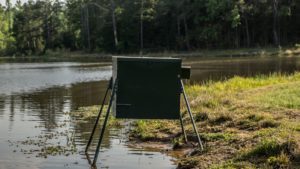 If you can visit your pond multiple times per day, every day, hand feeding will easily accomplish your purposes of feeding the fish.
If you can visit your pond multiple times per day, every day, hand feeding will easily accomplish your purposes of feeding the fish.
For the rest of us, this means using an automatic fish feeder. A quality fish feeder should hold an appropriate amount of feed to allow you to avoid having to constantly fill it. The feeder also should keep the feed dry and work consistently for years with limited repairs.
That being said, even the best feeders will occasionally have issues and require maintenance. Be sure to check your feeder’s operation each time you fill it. Filling and maintaining feeders is standard fare for all of our regular maintenance accounts.
How Much and How Often to Feed
This is a highly subjective decision.
A good biologist will weigh fish density, time of year, type of fish, daylight hours, and a budget to determine how much and how often to feed. A conversation with a good biologist should help you determine the amount that is appropriate for your pond or lake.
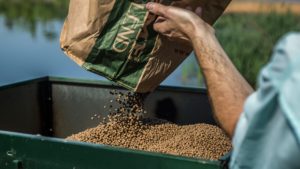 A few general principles apply: First, feed during daylight hours. Feeding during the day avoids allowing predators to grab a quick meal under the cover of darkness.
A few general principles apply: First, feed during daylight hours. Feeding during the day avoids allowing predators to grab a quick meal under the cover of darkness.
Fishermen generally visit ponds and lakes during the day so daylight feeding also will encourage the fish to be active when fishermen can most easily target them.
Second, spread feedings out over the day. Fish are similar to us in that they can only digest so much at a time. Feeding multiple times per day is better than all at once.
Third, you should expect your fish to eat more during the warmer months of the year than the cold. Feeding can be turned down during the winter. The one exception to this rule is trout. Trout can feed steadily all winter long.
What About Waste?
If you have fed fish for long, you are no doubt familiar with the occasional sight of a little leftover feed sitting at the edge of the lake.
Most lake owners are immediately concerned about this wasted feed.
But let’s dive into a few other things to consider.
First, know that fish have moods. Being cold blooded, they won’t feed evenly every day of the year. Occasional bits of leftover food are to be expected.
Sometimes fish experience delayed feedings, waiting 15 minutes or more before hitting the feed. Other times leftover feed might indicate that predators are terrorizing your fish. Keep a close eye on the feeders at feeding time and look for birds or otters that might learn to hang around the feeder.
In the vast majority of cases of leftover feed, marginal vegetation and algae is trapping the feed and fish just can’t get to that feed.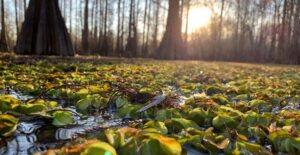
Effective management of pond weeds will reduce the growth and most of the time the fish will start cleaning up the remnants. If these reasons are explored and you are getting consistent waste, it’s time to turn down the feedings.
Turn the feeders down slightly and monitor excess feed to find the proper levels. Make sure to give your fish a couple of weeks to adjust to new feeding levels. Of course, on the flipside, if your fish are eating all the applied feed you can likely increase feeding levels to boost your fish production.
Fish Follow Food
In the end, fishing requires fish.
The more fish your lake contains, the more fish you will be able to catch when you fish.
If you remember nothing else, remember that fish food is the most cost-effective method we have at boosting the productivity of a given pond or lake. Establish a good feeding program as part of your fishery management and pond stocking plans and your fishing will improve.
Why Choose Lochow Ranch for Pond & Lake Management
Serving Texas, Oklahoma, Arkansas and Louisiana, Lochow Ranch Pond & Lake Management proudly puts more than two decades of experience to work for you. Our team includes biologists, technicians and other professionals with deep expertise in pond and lake management services.
Check us out if you are considering building a lake, looking for pond stocking services, to buy fish for a pond, or getting professional pond management and maintenance or fishery management. Our services include lake design, pond construction, pond renovation, pond water testing, electrofishing, pond stocking, control of pond weeds, and pond liming and fertilizing. Let us help you build your dream pond that will delight your family and friends for generations to come.
Click here to get in touch to get started today.
Matt Ward is a Fishery Biologist for Lochow Ranch Pond & Lake Management. He has a Master of Science in Biochemistry from Texas A&M University and has worked in fisheries management in Texas for 15 years. He brings a passion for good science and an interdisciplinary approach to the natural sciences to help property managers steward their aquatic resources and achieve management objectives.

Recent Comments